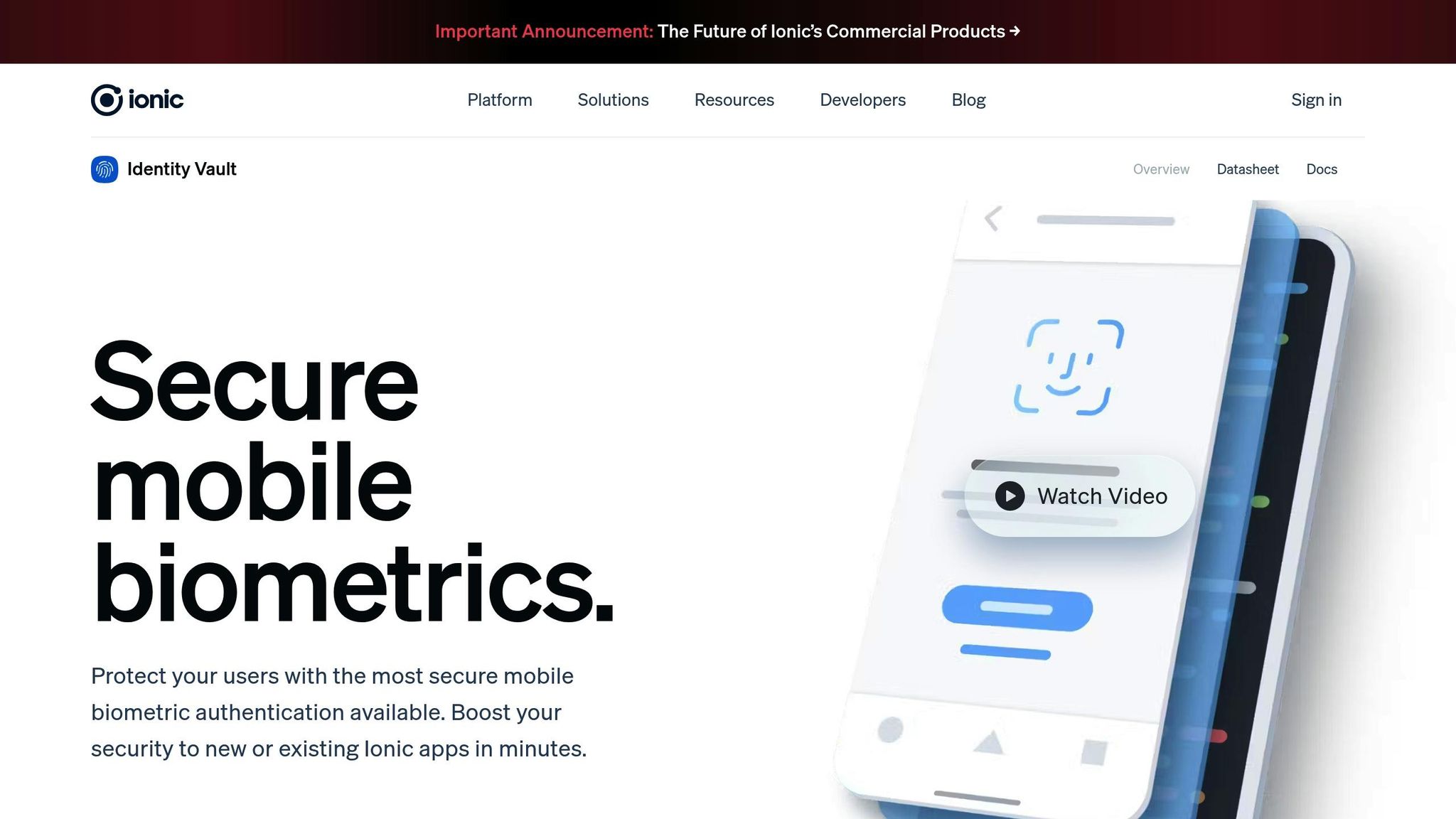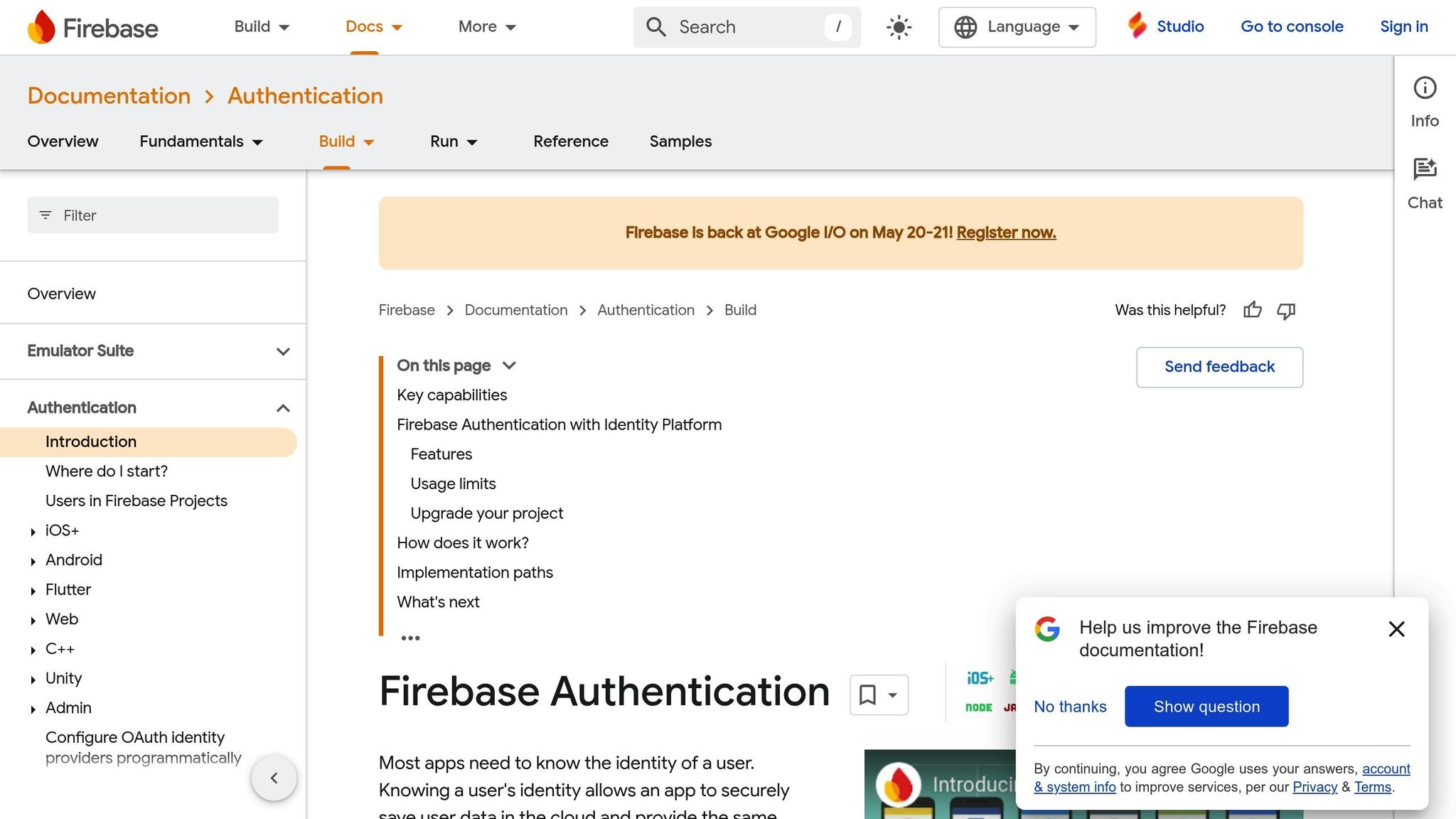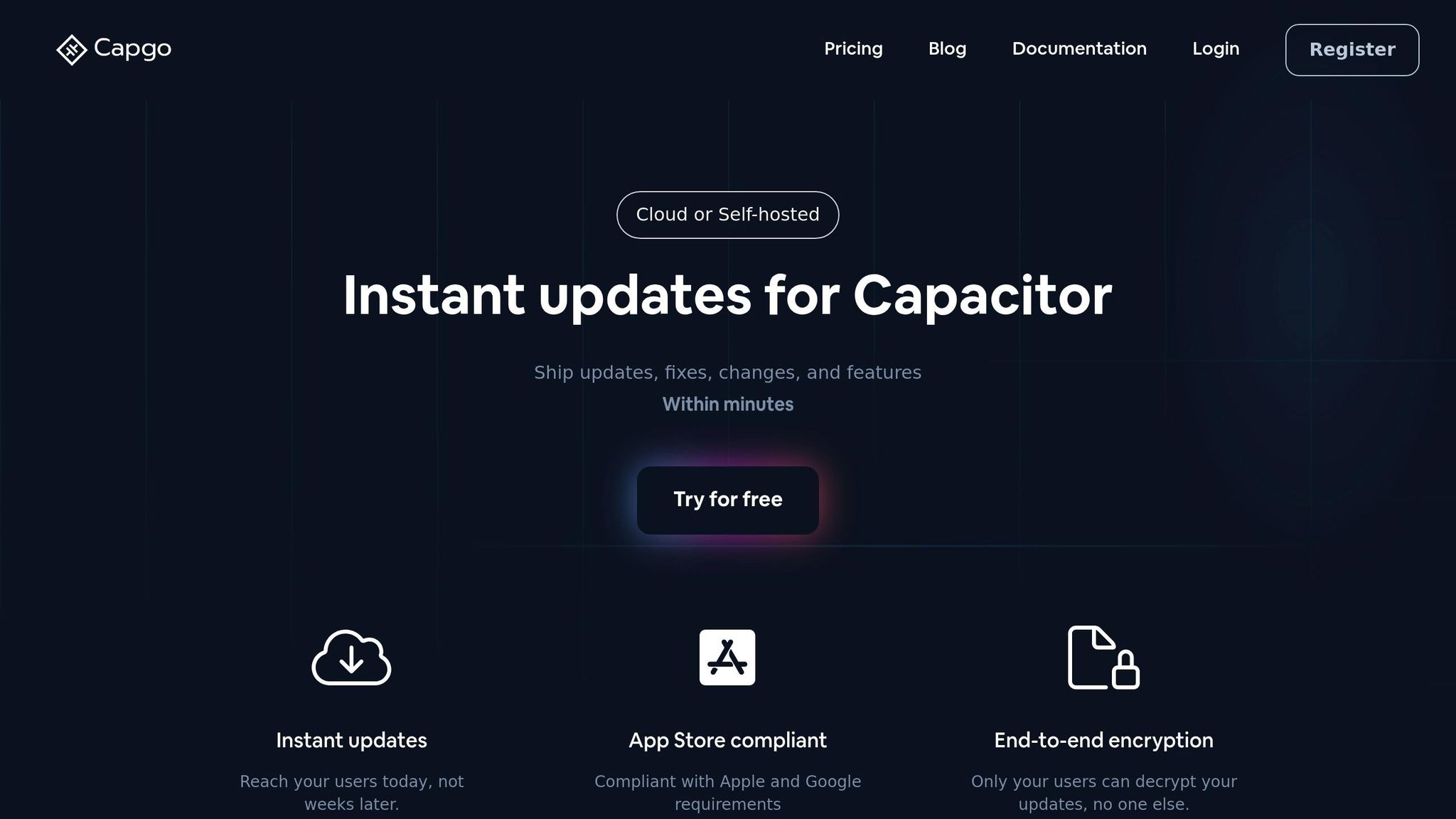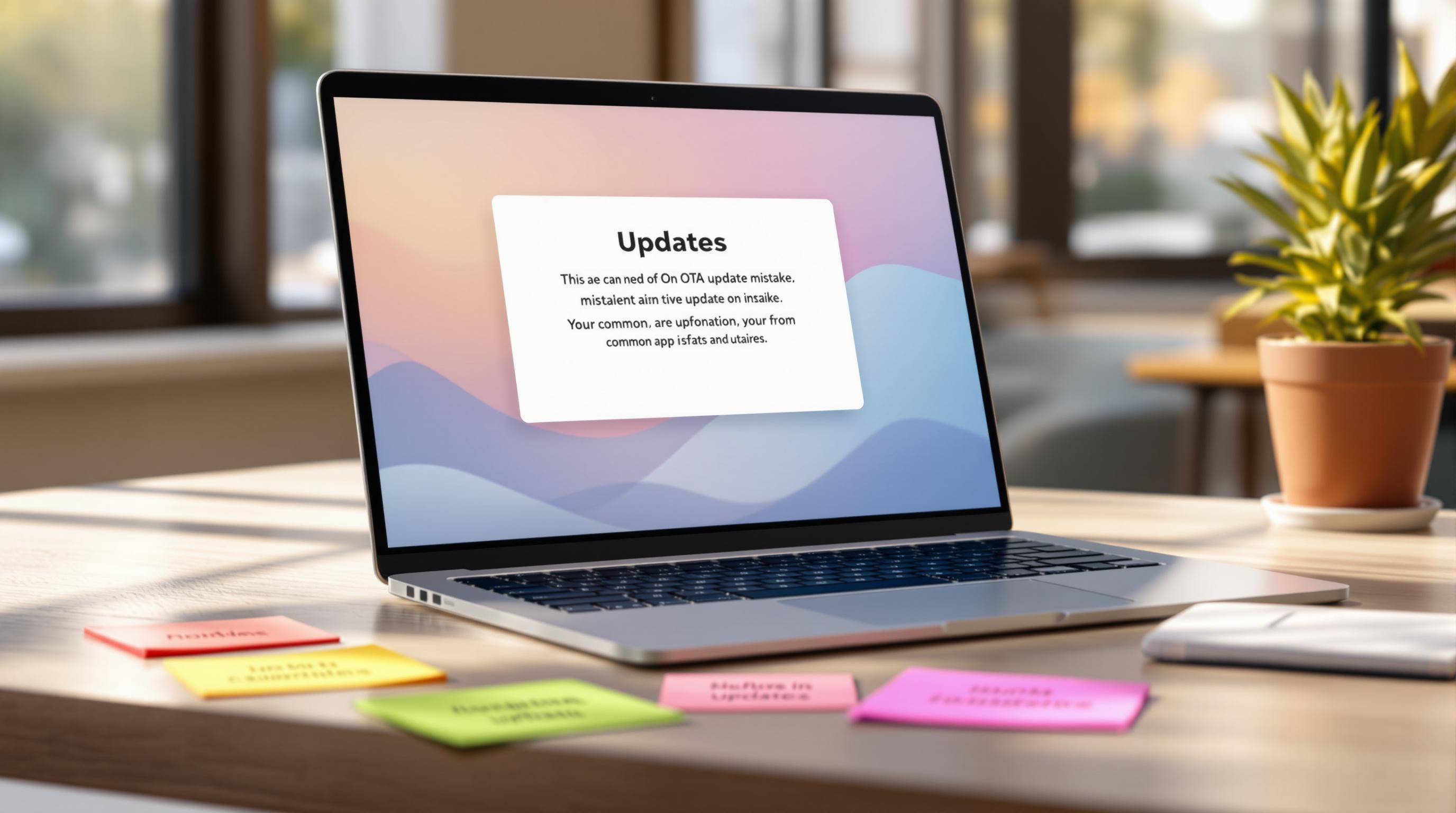Want to secure your app sessions? Here’s a quick guide to the best Capacitor plugins for session management. These tools help protect user data with features like biometric authentication, encrypted storage, and real-time updates. Here’s what you need to know:
- Firebase Auth: Multi-provider authentication, token management, and real-time state updates. Ideal for fast integration.
- Biometric Security Plugin: Adds fingerprint, face recognition, and device credential support for secure logins.
- @capgo/capacitor-persistent-account: Securely store account information with AES-256 encryption on iOS and Android.
- Identity Vault: Enterprise-grade solution with auto-logout, biometric authentication, and secure storage.
- Capgo: Combines secure session management with encrypted live updates for seamless deployments.
Quick Comparison
| Feature | Firebase Auth | Biometric Security | Persistent Account | Identity Vault | Capgo |
|---|---|---|---|---|---|
| Encryption Type | Cloud-based | Hardware-level | AES-256 (iOS/Android) | AES-256 (hardware) | End-to-end encryption |
| Biometric Support | Limited | Full | No | Full | No |
| Offline Capability | Partial | Yes | Yes | Yes | Yes |
| Enterprise Support | Yes | Community | Yes | Yes | Yes |
| Setup Complexity | Moderate | Low | Low | High | Moderate |
Need enterprise-level security? Go for Identity Vault. Looking for fast integration? Firebase Auth is your best bet. Need encrypted account storage? Try @capgo/capacitor-persistent-account. For live updates with security? Capgo has you covered.
Keep reading for detailed integration steps, features, and best practices to keep your app safe.
Ionic Identity Vault: Secure Mobile Biometric Authentication

1. Firebase Auth for Capacitor

Firebase Authentication offers a powerful way to manage secure sessions for Capacitor apps. By integrating Firebase’s native SDKs (Swift for iOS, Java for Android) alongside the Firebase JavaScript SDK for web, it ensures a smooth and consistent authentication experience across platforms [4].
Here are some of the standout security features:
| Feature | Description |
|---|---|
| Multi-provider Support | Seamless integration with Apple, Google, Microsoft, and Facebook authentication |
| Token Management | Secure handling of idToken, RefreshToken, and customToken |
| State Management | Real-time listeners for authentication state and ID token changes |
| Account Linking | Allows connecting multiple authentication providers to a single user account |
These features establish a solid security framework, enabling developers to enhance it further with measures like token revocation and multi-factor authentication.
Firebase projects are identified by API keys, but securing access depends heavily on properly configured Firebase Security Rules [5]. To strengthen security, developers should follow these practices:
- Revoke tokens during logout to prevent unauthorized access.
- Enable Multi-Factor Authentication (MFA) for sensitive accounts.
- Configure protection against email enumeration attacks.
Sharathdev’s December 2023 analysis highlighted that implementing token revocation during logout can significantly reduce the risk of account takeovers [6].
The plugin supports both native and web authentication flows. However, for mobile apps, native authentication is the preferred option due to WebView’s inherent limitations [4].
When compared to other session management tools, Firebase Auth stands out with its easy integration and extensive security features, making it an excellent choice for Capacitor apps that demand strong authentication capabilities.
2. Biometric Security Plugin
The Capacitor Biometric Security Plugin allows developers to integrate biometric and device credential authentication into their apps, ensuring secure user sessions. It supports various authentication methods, including biometric options like fingerprint, face recognition, and iris scanning, as well as device credentials such as PINs, patterns, and passwords. This functionality is available for both Android and iOS platforms [7].
| Authentication Feature | iOS Support | Android Support |
|---|---|---|
| Face Recognition | Face ID | Face Unlock |
| Fingerprint | Touch ID | Fingerprint Scanner |
| Device Credentials | Device Passcode | PIN/Pattern/Password |
| Biometric Strength Levels | Standard | Weak/Strong/Maximum |
Configuration Example
Here’s an example of how you can define the plugin settings:
const options = { allowDeviceCredential: true, androidBiometricStrength: 'WEAK', title: 'Verify Identity', subtitle: 'Use biometrics to access your account', cancelButtonText: 'Cancel Authentication'};Platform-Specific Setup
To implement the plugin, you’ll need to make some platform-specific adjustments:
- iOS: Add
NSFaceIDUsageDescriptionto theInfo.plistfile to explain why Face ID is being used. - Android: Include the
android.permission.USE_BIOMETRICpermission in theAndroidManifest.xmlfile.
These steps are essential for ensuring the plugin works seamlessly and aligns with secure session management strategies [8][10].
“Every Capacitor developer is responsible for making sure their app is following security best practices. Without proper care, major security issues can crop up which can prove extremely damaging and expensive.” – Capacitor Documentation [1]
Key Features and Updates
The plugin includes functionality to check for biometric availability, enrollment, and device credentials using methods like isAvailable(), isEnrolled(), and hasDeviceCredential(). Additionally, developers can encrypt tokens using platform-specific secure storage solutions, such as iOS Keychain and Android KeyStore, to enhance security [11].
Version 9.0.0, released in April 2025, introduced compatibility with Capacitor 7 and included improvements for iOS [9].
Advanced Security Measures
To further secure sessions, developers should implement automatic session timeouts and monitor for biometric changes. If changes are detected, authentication tokens should be invalidated to prevent unauthorized access [11]. The plugin also features a detailed error-handling system, providing feedback codes that help developers create fallback mechanisms and inform users when authentication fails [8].
This plugin offers a robust solution for integrating biometric security into modern apps, ensuring both convenience and protection for users.
How It Works Across Platforms
This plugin uses different security mechanisms tailored to each platform:
| Platform | Storage Mechanism | Encryption Method | Security Level |
|---|---|---|---|
| iOS | Encrypted Keychain | System Encryption | High |
| Android | KeyStore + SharedPreferences | AES-256 in GCM mode | High |
| Web (Development) | LocalStorage | Base64 Encoding | Low |
Key Features for Enhanced Security
Here are some of the standout features that make this plugin a reliable choice for securing session data:
- Cross-Device Synchronization: On iOS, the plugin supports iCloud Keychain sync, allowing secure data sharing across a user’s devices. This is particularly useful for managing sessions seamlessly.
- Strong Encryption: Android benefits from AES-256 encryption in GCM mode, leveraging the platform’s KeyStore for added protection.
- App-Specific Storage: Data stored through the plugin is restricted to your app, ensuring it remains isolated from other applications.
Best Practices for Implementation
To ensure optimal security, developers should adhere to these practices when using the plugin:
// Securely storing session credentialsawait SecureStorage.set({ key: "sessionToken", value: JSON.stringify({ token: "user-auth-token", timestamp: Date.now() })});
// Retrieving stored credentialsconst storedData = await SecureStorage.get({ key: "sessionToken" });These examples provide a starting point for integrating secure storage into your app.
Important Security Notes
When implementing this plugin, keep these considerations in mind:
- Web Storage Limitations: Data stored on the web is not encrypted and should be limited to development environments.
- Android Requirements: Devices must run Android 6.0 (API level 23) or higher to support the plugin’s encryption features.
- Key Management: Regularly rotate encryption keys and validate data before encrypting it to maintain security over time.
Biometric Authentication Integration
The plugin works seamlessly with biometric authentication, offering an additional layer of security. This combination strengthens session management by uniting multiple security measures into a cohesive framework.
Performance and Community Support
As of May 2025, the plugin has garnered a solid reputation within the Capacitor ecosystem, with 128 stars and 22 forks on GitHub. It’s fully compatible with Capacitor 8+, enabling developers to implement secure storage while taking advantage of the latest framework features.
4. Identity Vault
Identity Vault is a high-level solution designed for enterprises, combining secure session management with biometric authentication to enhance data protection.
Core Security Features
Identity Vault uses platform-specific security tools to safeguard sensitive information. Here’s a quick breakdown:
| Feature | Implementation | What It Does |
|---|---|---|
| Secure Storage | iOS Secure Enclave / Android KeyStore | Provides encryption at the hardware level. |
| Biometric Auth | TouchID/FaceID on iOS, Fingerprint on Android | Adds a layer of multi-factor authentication. |
| Session Protection | Background screen protection | Prevents data exposure when the app is minimized. |
| Auto-logout | Automatic logout after inactivity | Protects accounts by logging out inactive users. |
Advanced Implementation Options
Beyond its foundational features, Identity Vault offers additional flexibility in how it can be implemented:
- Secure Storage: Basic encrypted storage for sensitive data.
- Device Security: Combines biometric authentication with a fallback passcode for added reliability.
- InMemory: Temporary secure storage that clears automatically when the app is closed, ensuring no lingering data remains.
Native Security Integration
Identity Vault seamlessly integrates with native security tools like iOS Secure Enclave and Android KeyStore. By doing this, it simplifies the development process, allowing developers to avoid the complexity of directly handling platform-specific APIs while still achieving robust session protection.
Security Best Practices
To ensure optimal security, consider these key recommendations:
- Token Management: Always store authentication tokens using hardware-level encryption to prevent unauthorized access.
- Inactivity Handling: Set up automatic logout after a period of user inactivity to reduce risks.
- Background Protection: Enable screen protection to prevent sensitive data from being visible when the app is running in the background.
Technical Advantages
Identity Vault consolidates 12 separate APIs into a single plugin, making integration much smoother and more efficient [12].
Enterprise and Performance Benefits
For enterprise applications, Identity Vault offers a streamlined identity management solution. By leveraging native APIs, it not only simplifies development but also ensures fast and reliable performance tailored to enterprise needs.
5. Capgo

Capgo goes beyond robust storage and biometric solutions by offering secure session management paired with live update delivery. With a strong focus on data integrity, Capgo ensures session data remains protected through end-to-end encryption and real-time updates.
Security Architecture
Capgo’s security framework is built to safeguard every aspect of live updates. Here’s how its features contribute to a secure environment:
| Feature | Implementation | Security Benefit |
|---|---|---|
| End-to-End Encryption | Secure update delivery protocol | Prevents unauthorized code modifications |
| Partial Updates | Delta-only file transmission | Reduces the attack surface during updates |
| Channel System | Controlled deployment paths | Ensures secure, staged rollouts |
| Real-time Analytics | Performance monitoring | Identifies and addresses security anomalies |
This layered approach ensures not only secure sessions but also the safe delivery of updates that enhance overall security.
Performance and Reliability
Capgo combines security with impressive performance metrics, ensuring reliable and efficient update deployments:
- Update Speed: Transfers 5MB bundles in just 114ms, minimizing exposure to vulnerabilities during updates [13].
- API Response: Maintains an average response time of 434ms for critical security operations [13].
- Update Success Rate: Secures an 82% global success rate for deployments [13].
- User Coverage: Reaches 95% of active users with security updates within 24 hours [13].
These metrics highlight Capgo’s commitment to balancing speed and reliability without compromising security.
Enterprise-Grade Security Features
Capgo incorporates advanced security measures tailored for enterprise needs, including:
- Version Control: Offers secure rollback options to previous versions.
- CI/CD Integration: Seamlessly integrates with tools like GitHub Actions, GitLab CI, and Jenkins for automated, secure deployments.
- Access Control: Enables user-specific update distribution for enhanced control.
- Compliance: Meets security standards required by both Apple and Android platforms.
These features make Capgo a trusted choice for organizations prioritizing secure and controlled updates.
Production-Ready Infrastructure
Capgo’s capabilities are already proven, with over 1,700 apps running in production environments [13]. The platform supports both cloud-hosted and self-hosted setups, offering flexibility to meet varying security and deployment needs.
Technical Implementation
Capgo’s channel system is designed for secure beta testing, staged rollouts, and version control, all backed by real-time analytics. By combining strong encryption with practical deployment tools, Capgo delivers a solution that meets the demands of organizations requiring both security and adaptability in their update processes.
Plugin Comparison
This section provides a comparative look at Capacitor plugins for secure session management, focusing on security features, integration needs, and performance. It’s designed to offer a quick reference for making informed decisions.
Core Security Features Comparison
Here’s a side-by-side breakdown of the key security features offered by the plugins:
| Feature | Firebase Auth | Biometric Security | Identity Vault | Capgo | | --- | --- | --- | --- | --- | --- | | Encryption Type | Cloud-based | Hardware-level | 256-bit AES | 256-bit AES | End-to-end | | Biometric Support | Limited | Full | No | Full | No | | Offline Capability | Partial | Yes | Yes | Yes | Yes | | Enterprise Support | Yes | Community | Community | Yes | Yes | | Secure Enclave Use | No | Yes | No | Yes | No |
Implementation Requirements
The table below highlights the setup complexity, platform compatibility, and any additional dependencies for each plugin:
| Plugin | Setup Complexity | Platform Support | Additional Dependencies |
|---|---|---|---|
| Firebase Auth | Moderate | iOS, Android | Firebase SDK |
| Biometric Security | Low | iOS, Android | None |
| Low | iOS, Android | None | |
| Identity Vault | High | iOS, Android, Web | Auth Connect |
| Capgo | Moderate | iOS, Android | None |
These details help align plugin choices with your project’s technical requirements and resources.
Security Compliance Standards
The plugins reviewed adhere to strict security protocols, offering robust data protection and streamlined OAuth2 workflows. Enterprise-grade options like Identity Vault and Capgo include:
- Secure storage using keychain/keystore techniques [1]
- PKCE (Proof Key for Code Exchange) for OAuth2 flows [1]
- SSL-enabled endpoints for secure communication [1]
- Enforced Content Security Policies (CSP) [1]
Performance Considerations
Performance varies across plugins, especially in areas like authentication speed and data storage efficiency. Identity Vault stands out for its advanced security features, which leverage secure enclaves and strong encryption without compromising performance [2].
Integration Flexibility
Each plugin offers different levels of integration support, as shown below:
| Plugin | CI/CD Integration | Custom Implementation | Migration Support |
|---|---|---|---|
| Firebase Auth | Native Support | Limited | Moderate |
| Biometric Security | Manual | Full | Limited |
| Manual | Full | Easy | |
| Identity Vault | Enterprise Tools | Full | Comprehensive |
| Capgo | Automated | Full | Comprehensive |
Cost-Benefit Analysis
Enterprise plugins come with extensive features and dedicated support, making them ideal for larger projects, though they often come at a higher price point [2].
Developer Experience
The developer experience with these plugins is influenced by their documentation and ease of integration. Capacitor’s “web first” approach simplifies the transition for web developers moving into mobile app development, making secure session management more accessible [3].
Real-World Application
For enterprise-level security needs, solutions like Identity Vault and Capgo provide robust features and comprehensive support. On the other hand, community-driven plugins are better suited for smaller projects with less demanding security requirements.
Recommendations
Here’s a breakdown of recommended solutions based on different use cases:
For Small to Medium-Sized Applications
For smaller teams with tight budgets, @capgo/capacitor-persistent-account is a solid choice. It securely stores account information using platform-native encryption (iOS Keychain and Android KeyStore), providing AES-256 encryption for basic secure session management on both iOS and Android with strong support.
For Enterprise Applications
For organizations that require top-tier security, Identity Vault stands out. Built on native security APIs, it’s designed to handle sensitive keys and tokens, making it suitable for environments with strict regulatory requirements.
For Rapid Development Cycles
When speed is a priority, Firebase Auth is an excellent pick. Its cloud-based infrastructure, built-in user management features, and extensive documentation make it ideal for MVPs and prototypes, allowing teams to implement solutions quickly and efficiently.
For Compliance-Critical Applications
For projects operating under strict regulatory standards, these targeted solutions address specific compliance needs:
| Requirement | Recommended Plugin | Key Benefit |
|---|---|---|
| Data Privacy & GDPR | Capgo | End-to-end encryption |
| Regulatory & Government Needs | Capgo | Role-based access control |
| Enterprise-Grade Security | Identity Vault | Native security API integration |
- Capgo focuses on ensuring data privacy compliance, including GDPR, while also offering tools for role-based access control.
- Identity Vault specializes in seamless integration with native security APIs, catering to enterprise-grade security needs.
Special Use Cases
For apps that need offline functionality and secure token management, a hybrid approach works best:
- Use Identity Vault to store sensitive data securely.
- Pair it with the Capacitor Preferences API for handling non-sensitive data.
- Leverage secure keychain/keystore techniques for persistent token storage.
Keep in mind, the Capacitor Preferences API should only be used for minimal, non-sensitive data, while sensitive information must be stored using secure keychain or keystore integrations. This ensures a balanced approach to security and functionality.
FAQs
::: faq
What features do Capacitor plugins offer for secure session management, including encryption and biometric authentication?
Capacitor plugins designed for secure session management take different approaches when it comes to encryption and biometric authentication. Many rely on AES-256 encryption to safeguard session data, providing a strong defense against unauthorized access. When it comes to biometric features, the level of support can vary. For instance, the Capacitor Native Biometric plugin integrates directly with device-level biometric systems like fingerprint or facial recognition, adding an extra layer of protection to user sessions.
Capgo takes things a step further by combining end-to-end encryption with smooth biometric authentication. This combination ensures both robust data security and a hassle-free user experience, making it a standout option for developers aiming to boost app security without sacrificing usability. :::
::: faq
How can I securely integrate biometric authentication into a Capacitor app using the Biometric Security Plugin?
To integrate biometric authentication securely into a Capacitor app, start by taking advantage of the built-in security features offered by mobile operating systems, such as the iOS Keychain and Android Keystore. These systems provide hardware-backed protection for sensitive data like encryption keys and session tokens, ensuring they remain secure.
When setting up biometric authentication, use the authenticate() method from the Biometric Security Plugin. This allows you to customize the authentication prompt, including elements like the title and button text, to create a user-friendly experience. For devices that don’t support biometrics, make sure to include fallback options like PIN or password authentication to maintain accessibility.
It’s crucial to avoid hardcoding secrets directly in your app. Instead, encrypt any stored tokens to strengthen security further. Additionally, tools like Capgo can enhance secure session management by offering encrypted, real-time updates for your Capacitor app. :::
::: faq
How does Capgo keep live updates secure while managing app sessions?
Capgo prioritizes security with end-to-end encryption for live updates. This means your app bundle is encrypted before it’s sent to the cloud and only decrypted on the user’s device, ensuring your data stays protected throughout the process.
Updates are handled seamlessly in the background, so users aren’t interrupted while using the app. They’ll only see an update notification when they relaunch the app, keeping the experience smooth and aligning with app store rules. :::




